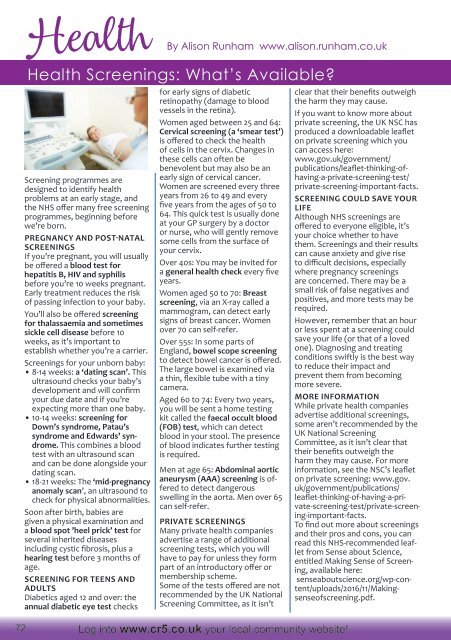CR5 Issue 157 June 2018
A local community magazine containing local business advertising along with interesting reads, puzzles and What's On in the local area
A local community magazine containing local business advertising along with interesting reads, puzzles and What's On in the local area
Create successful ePaper yourself
Turn your PDF publications into a flip-book with our unique Google optimized e-Paper software.
Health By<br />
Alison Runham www.alison.runham.co.uk<br />
Health Screenings: What’s Available?<br />
Screening programmes are<br />
designed to identify health<br />
problems at an early stage, and<br />
the NHS offer many free screening<br />
programmes, beginning before<br />
we’re born.<br />
PREGNANCY AND POST-NATAL<br />
SCREENINGS<br />
If you’re pregnant, you will usually<br />
be offered a blood test for<br />
hepatitis B, HIV and syphilis<br />
before you’re 10 weeks pregnant.<br />
Early treatment reduces the risk<br />
of passing infection to your baby.<br />
You’ll also be offered screening<br />
for thalassaemia and sometimes<br />
sickle cell disease before 10<br />
weeks, as it’s important to<br />
establish whether you’re a carrier.<br />
Screenings for your unborn baby:<br />
• 8-14 weeks: a ‘dating scan’. This<br />
ultrasound checks your baby’s<br />
development and will confirm<br />
your due date and if you’re<br />
expecting more than one baby.<br />
• 10-14 weeks: screening for<br />
Down’s syndrome, Patau’s<br />
syndrome and Edwards’ syndrome.<br />
This combines a blood<br />
test with an ultrasound scan<br />
and can be done alongside your<br />
dating scan.<br />
• 18-21 weeks: The ‘mid-pregnancy<br />
anomaly scan’, an ultrasound to<br />
check for physical abnormalities.<br />
Soon after birth, babies are<br />
given a physical examination and<br />
a blood spot ’heel prick’ test for<br />
several inherited diseases<br />
including cystic fibrosis, plus a<br />
hearing test before 3 months of<br />
age.<br />
SCREENING FOR TEENS AND<br />
ADULTS<br />
Diabetics aged 12 and over: the<br />
annual diabetic eye test checks<br />
for early signs of diabetic<br />
retinopathy (damage to blood<br />
vessels in the retina).<br />
Women aged between 25 and 64:<br />
Cervical screening (a ‘smear test’)<br />
is offered to check the health<br />
of cells in the cervix. Changes in<br />
these cells can often be<br />
benevolent but may also be an<br />
early sign of cervical cancer.<br />
Women are screened every three<br />
years from 26 to 49 and every<br />
five years from the ages of 50 to<br />
64. This quick test is usually done<br />
at your GP surgery by a doctor<br />
or nurse, who will gently remove<br />
some cells from the surface of<br />
your cervix.<br />
Over 40s: You may be invited for<br />
a general health check every five<br />
years.<br />
Women aged 50 to 70: Breast<br />
screening, via an X-ray called a<br />
mammogram, can detect early<br />
signs of breast cancer. Women<br />
over 70 can self-refer.<br />
Over 55s: In some parts of<br />
England, bowel scope screening<br />
to detect bowel cancer is offered.<br />
The large bowel is examined via<br />
a thin, flexible tube with a tiny<br />
camera.<br />
Aged 60 to 74: Every two years,<br />
you will be sent a home testing<br />
kit called the faecal occult blood<br />
(FOB) test, which can detect<br />
blood in your stool. The presence<br />
of blood indicates further testing<br />
is required.<br />
Men at age 65: Abdominal aortic<br />
aneurysm (AAA) screening is offered<br />
to detect dangerous<br />
swelling in the aorta. Men over 65<br />
can self-refer.<br />
PRIVATE SCREENINGS<br />
Many private health companies<br />
advertise a range of additional<br />
screening tests, which you will<br />
have to pay for unless they form<br />
part of an introductory offer or<br />
membership scheme.<br />
Some of the tests offered are not<br />
recommended by the UK National<br />
Screening Committee, as it isn’t<br />
72 Log into www.cr5.co.uk your local community website!<br />
clear that their benefits outweigh<br />
the harm they may cause.<br />
If you want to know more about<br />
private screening, the UK NSC has<br />
produced a downloadable leaflet<br />
on private screening which you<br />
can access here:<br />
www.gov.uk/government/<br />
publications/leaflet-thinking-ofhaving-a-private-screening-test/<br />
private-screening-important-facts.<br />
SCREENING COULD SAVE YOUR<br />
LIFE<br />
Although NHS screenings are<br />
offered to everyone eligible, it’s<br />
your choice whether to have<br />
them. Screenings and their results<br />
can cause anxiety and give rise<br />
to difficult decisions, especially<br />
where pregnancy screenings<br />
are concerned. There may be a<br />
small risk of false negatives and<br />
positives, and more tests may be<br />
required.<br />
However, remember that an hour<br />
or less spent at a screening could<br />
save your life (or that of a loved<br />
one). Diagnosing and treating<br />
conditions swiftly is the best way<br />
to reduce their impact and<br />
prevent them from becoming<br />
more severe.<br />
MORE INFORMATION<br />
While private health companies<br />
advertise additional screenings,<br />
some aren’t recommended by the<br />
UK National Screening<br />
Committee, as it isn’t clear that<br />
their benefits outweigh the<br />
harm they may cause. For more<br />
information, see the NSC’s leaflet<br />
on private screening: www.gov.<br />
uk/government/publications/<br />
leaflet-thinking-of-having-a-private-screening-test/private-screening-important-facts.<br />
To find out more about screenings<br />
and their pros and cons, you can<br />
read this NHS-recommended leaflet<br />
from Sense about Science,<br />
entitled Making Sense of Screening,<br />
available here:<br />
senseaboutscience.org/wp-content/uploads/2016/11/Makingsenseofscreening.pdf.

















